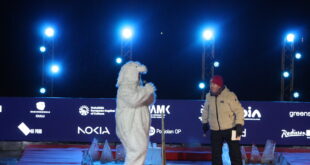This year edition of the Copenhagen Documentary Festival showed a variety of films that opened windows into the worlds of art, technology, and startups.
Under the category ‘’Before and After Science’’ the festival gathered movies in which science and cinema cross paths, giving the latest new innovations and research a visual form.
Can technology and our progress brings intimacy in the future?
This is one of the questions in ‘’Alice Cares’’, which investigates people will accept having relations to computers in the future, in a more intimate form. As health-tech rapidly expands, new possibilities are created for people interacting with robots.
The Dutch documentary starts from a very basic point: in the near future, the amount of old people will be greater than ever, and we need a way to provide health care and companionship to the elderly, and robots can be a solution. The movie follow a team of researchers from VU Amsterdam University who are developing a robot with AI, named Alice, and the three old ladies who interact with it. The result is a fascinating and heartwarming showcase of trust and skepticism towards artificial interaction.
Social change through tech
Another very powerful documentary showcased at the festival has been the American ‘’Code Girl’’, where teams of high school girls from around the world are gathered in an app- building competition. This movie focuses on the early stage empowerment of women in the tech world – still dominated by man – and social change, as the app developed by the young girls has to improve their community and life quality.
At the CPH:DOX Conference, the theme was the correlation between technology, art, and change. Speakers took the stage to present how in their daily working life interacts with technology. Various sectors were touched upon, including journalism, food, NGOs, and space.
The conference started with a surreal visit to the beta world of the future from Liam Young, Founder of Tomorrows Thoughts Today, showing the “landscape of the landscape of the future”: the Facebook Data Center in Oregon, USA.
Senior Design Lead at NASA Jesse Kriss beautifully introduced the concept of fiction as a core concept directing to create new assets. Fiction leads to exploration, many startups begin by questioning the unthinkable; imagined but not existing. The story of NASA, in fact, looks like the fictional story “From the Earth to the Moon” by Jules Verne, and Google’s Glasses seems to have been drawn from 1901 tale “The Master Key: An Electrical Fairy Tale2 by L. Frank Baum.
Virtual reality – champions and skeptics
The conference was very much focused on the development and usage of virtual reality (VR). Two journalists spoke about their relation to VR in their work: Christian Stephen filmed the first VR film in a war zone – ”Welcome to Aleppo”, and Tim Pool, Director of Media Innovation at Fusion and Co-Founder of the app Taggly, who reported 21 hours of mobile coverage during the Wall Street protests.
Both have seen the limits of technology within journalism; though reporting has been done through google glasses, VR, and drones, journalism comes from humans, and therefore we have to be careful in which direction we lead technological change.
Less skepticism towards technology came from the global art collective BeAnotherLab, who used technology to explore the possibility of enhancing mutual respect, common understanding, and rehabilitation. BeAnotherLab attempts to use VR as a means to help people enhance empathy and connectivity with others, by letting users virtually experience other peopleøs bodies, for example, that of somebody with a serious illness.
One of the last speakers of the event was Julia Kaganskiy, of NEW INC, the first museum-led incubator for startups in the field of art and creativity, which attempts to bridge artistic provocation with an entrepreneurial spirit to enable ideas that make culture better. The incubator, which in many ways is similar to Oslo’s startup hub Mesh, is a space where art and technology unlock innovation and catalyze change through facilitating partnerships with other creatives and building a vibrant network and community.
CPH:DOX also offered storytellers and filmakers an arena in which to discuss personal projects together, with the possibility to pitch their movies to a panel of experts, who provided suggestions for improvement and could help the pitches be produced.
 Nordic Startup News Early Stage Startup News From The Nordics
Nordic Startup News Early Stage Startup News From The Nordics



